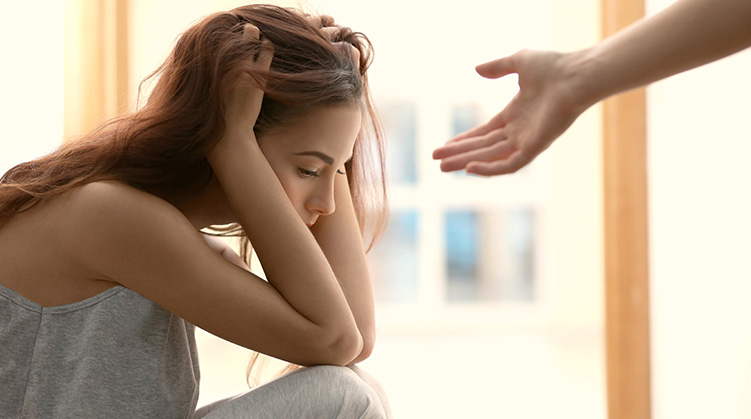
Depression
What is Depression?
Depression is a condition where the person can feel sad, lonely, hopeless, have no or little motivation and be tired all the time. It is a condition that many people will experience at some stage in their lives, some worse than others. Approximate three in five people will experience depression at some stage in their lives and one in five people have it now. Unfortunately, despite increasing awareness, many people don’t realise that they have it or don’t want to address depression due to the stigma. It is a mental illness, that like other illness’, you can’t just get over. We would never tell someone with pneumonia or a broken leg just to get on with it and nor should we say these things to those with depression.
Depression can present in many ways. For some people, they may seem angry and isolative, others can take risky behaviours, some may drink more alcohol or take more drugs than they did before. If you have a friend whose behaviour has changed or you are worried about them, talk with them and ask them to talk to their GP.
How do I know if I have it?
There is are criterion that must be fulfilled to make the diagnosis. The DSM V is the guide that medical professionals use to assess if depression is present.
DSM-IV Criteria for Major Depressive Disorder (MDD) are:
- Depressed mood or a loss of interest or pleasure in daily activities for more than two weeks.
- Mood represents a change from the person’s baseline.
- Impaired function: social, occupational, educational.
- Specific symptoms, at least 5 of these 9, present nearly every day:
- Depressed mood or irritable most of the day, nearly every day, as indicated by either subjective report (e.g., feels sad or empty) or observation made by others (e.g., appears tearful).
- Decreased interest or pleasure in most activities, most of each day
- Significant weight change (5%) or change in appetite
- Change in sleep: Insomnia or hypersomnia
- Change in activity: Psychomotor agitation or retardation
- Fatigue or loss of energy
- Guilt/worthlessness: Feelings of worthlessness or excessive or inappropriate guilt
- Concentration: diminished ability to think or concentrate, or more indecisiveness
- Suicidality: Thoughts of death or suicide, or has suicide plan
There are several online assessment tools that you can use to see if you may have depression:
If you have a score that is concerning, please see your GP.
How does this happen?
We are unsure of exactly what causes depression. We known that certain people are at increased risk of developing depression over their lives.
- Genetics: if members of your family have suffered with depression there is an increase chance that you will too
- Personality: some personality types are also more likely to develop depression. Those who are worries or need things to be a certain way are at higher risk
- Serious illness: experiencing life challenging illness can cause depression
- Alcohol and other drugs: increase use of these drugs, including cannabis increases the chance of depression. Most of these drugs are depressant in nature, though there is also a level of self-medicating
- Life events: long term stress can be associated with the development of depression. Unemployment, domestic violence, financial stress, loss of community, loneliness are all associated with depression.
What is Pathophysiology?
There is some evidence that there are chemical changes in the brain that are associated with depression. Changes in the level of serotonin, noradrenaline and dopamine have been shown to be related to the development of depression.
How do I fix it?
There are a variety of ways to address depression. The resolution of depressive symptoms may take a variety of methods and may be different for each person.
- Exercise: exercise has been shown to assist with recovery and the prevention of depression
- Mindfulness meditation: assists with being aware of what is happening without any judgement. There are many apps on smart phones and online to assist with this
- Counsellors: can assist with just talking things through and assisting in exploring why things may ahppen
- Psychology: a psychologist will assist you to address how your think and provide ways to retrain your brain. This is called cognitive behaviour therapy. They may also assist with redeveloping your interpersonal skills.
- Medications: there are a lot of differing types of medication that can assist. Sometimes, you may need to try a few to find the one that works best for you
- Electroconvulsive Therapy or Transcranial Magnetic Therapy: for very severe cases this may be recommended by a psychiatrist
Where can I get more information?
The following websites can assist with further information or see your GP.




